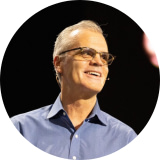Can the Bible still speak to the meaning of life in a modern world?
For more than 30 years, we have heard about how our society has become post-Christian. More than two-thirds of the churches in the United States have plateaued or declined in the 21st century. At the same time, an increasing number of “emerging adults”, a new phase and phrase for young American life, has declared itself non-religious (otherwise known as “nones”).
Late modern culture, it’s believed, is the first culture in history based on a general rejection of a sacred order. In the name of individual freedom, it’s generally believed there are no transcendent realities to which people must conform or answer to for their lives. We are free to create our own set of values and our own meaning of life.
Where do modern people turn to find a deeper meaning to their lives?
Where do people now turn to find meaning in life without the larger idea of a personal God? Where do modern people, most particularly young adults, turn to find a deeper meaning to their lives?
Sadly, many now turn to social media and new forms of technology. In the U.S., the average person now spends up to three hours a day on some form of social media. For many students and younger adults, the numbers are higher. The average 12th grader is online four hours a day. The virtual explosion of knowledge now available to most young people has significantly widened the scope of what is known—both about ourselves and the wider world.
Gen Z became the first generation in history to go through puberty with a portal in their pockets that called them away from the people nearby and into an alternate universe that was exciting, addictive, and unstable. They spent far less time playing with, talking with, even making eye contact with their friends and families, thereby reducing their participation in embodied social behaviors that are essential for successful human development.
–Jonathan Haidt
Yet this availability of greater knowledge has not produced wiser and more mature people overall. It has instead produced an anxious generation of people who are less independent, less sure of themselves, and more unsure about their futures.
If we hope to reach the spiritually lost all around us, we need to better prepare ourselves to discuss the questions people are asking today.
Christians have believed throughout the church’s history that God’s Truth, as reveled in the Scriptures, is timeless. Truth that speaks to the central questions people have about their lives in every generation. But this Truth must always be understood in the broader social and cultural contexts that shape it, help explain it, and give it meaning. This work is the responsibility of all followers of Jesus, not simply pastors and spiritual leaders. If we hope to reach the spiritually lost all around us, we need to better prepare ourselves to discuss the questions people are asking today.
All worldviews that are not biblically based are like a suit of clothes that are too small. Such clothes always uncomfortably pinch—and occasionally rip. The late modern view of reality does not fit human nature as God designed it. There are times that this view rips and fails to provide what is needed to face such experiences. Christians need to be prepared in these moments to give answers.
–Tim Keller
The church is best described as a group of friends who together follow Jesus. This includes being open about joys and struggles, doubts and fears, and real questions about the Christian faith. This is the purpose of the Alpha ministry that we are hosting again this fall. Our August sermon series, “Life’s Questions”, is the starter conversation.
In this series, beginning Sunday, we will look at five of the big questions explored in the Alpha program with the hopes of knowing how to better talk about them with others around us. People admire confidence and strength, but they connect deeply with openness and honesty. Real love. Real hope. Real vulnerability. And real friends.
We are offering the Alpha ministry again this fall, this time with a particular focus on emerging adults, those between the ages of 18-39. The program will be hosted onsite with one of our local partners, New City Café. Alpha will meet at New City on Tuesday nights starting September 16th. If you would like to be a part of this experience, or know someone you would like to invite, please visit our Alpha with Browncroft info page.
I encourage you to be thinking and praying about who in your life might be open to being a part of this fall’s Alpha offering. I also encourage all of you to revisit these core questions for yourself. Before we can share our faith effectively, we need to own it more deeply ourselves. As you begin to live out the answers, people will start asking you their questions.
But in your hearts revere Christ as Lord. Always be prepared to give an answer to everyone who asks you to give the reason for the hope that you have. But do this with gentleness and respect.
1 Peter 3.15
Looking forward to learning and growing in this series along with you.
Pastor Rob





